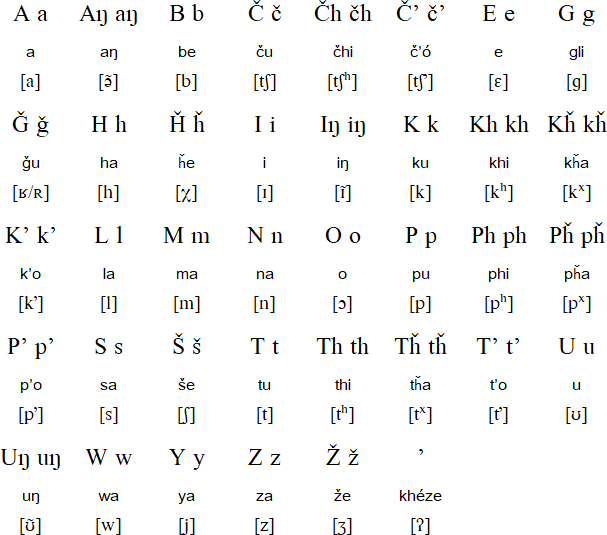Lakota is spoken mainly in North Dakota and South Dakota in the USA, and also in northern Nebraska, northeast Wyomning and southeast Montana. In North Dakota Lakota is spoken in Bismark and Standing Rock reservation (Íŋyaŋ Woslál Háŋ). In South Dakota it is spoken in Cheyenne River, Lower Brule reservation, Pine Ridge, Rapid City and Rosebud. In 1997 there were about 2,100 speakers of Lakota, most of whom are older adults. There are efforts to revitalise the language, with classes at all levels of education from preschool to university.
The name "Sioux" is a French version of the Ojibwa word nadewisou, which means "treacherous snakes". The native names for the Sioux mean "An Alliance of Friends", which is Lakhota in the Teton dialect. There are a number of different spellings of these names. Lakota is also known as Lakhota, Lakotiyapi, Teton or Teton Sioux.
Lakota was first written by European and American missionaries in about 1840. Since then a number of way to write the language have been developed. The most commonly-used one was developed for the New Lakota Dictionary, which was published in 2008 by the Lakota Language Consortium.

Download an alphabet chart for Lakota
Hećeś hokśila wan kunśitku kićilaḣći ti śke. Yunkan anpetu wan el kunśitku kin ćanḳin iyaya ćanke hokśila kin iśnala tiyata yanke ćin ićunhan hitunkala wan taku yaḳoġa-han ća naḣun keye. Ḳeyaś he winuḣćala kin woyute mahel yuha kin hokśila kin hehanhunniyan slolye śni keye. Ho, tka wana le naḣun kin un wole yunkan wasna wan lila waśte kunśitku kin gnaka ća he e ća hitunkala kin yuta-han keye.
Part of a story called "Turtle Moccasin Boy" written down by Ella Deloria and in the Riggs 1852 orthography
Hear a recording of this text by Jared Lanz
Source: http://www.languagegeek.com/siouan/lakotastory.html - shows the same text in eight different Lakota spelling systems
Eháŋni héčheš oyáte waŋ igláka áyiŋ na waná éthipi yuŋhĥáŋ wičháša waŋ tĥawiču kiŋ hečíya: "Winúĥča, itĥó wayé mní kte ló, " eyá.
Ečháš toháŋ waglí šni héhaŋ éna thí po, " eyá.
Hear a recording of this text by Jared Lanz
Long ago, the tribe was moving camp and were erecting their tipis at the new place when a man said to his wife: " Wife, I think I must go out and hunt."
So don't move on with the tribe if they should go
on, but stay camped here until I return."
An extract from "Man rescued by eagles" by George Bushotter
You can see and hear the complete story at
http://www.inext.cz/siouan/bushotter/bushotter.htm
Wičháša na wíŋyaŋ otóiyohi iglúhapi na iyéhaŋyaŋ wówažapi. Tȟaŋmáhel slol'íč'iyapi na kičhíwičhowepi s'e kičhíčhuwapi kta héčha.
Translated into Lakota Sioux by Joe Bellman
Hear a recording of this text by Jared Lanz
Each and every man and woman is free and has equal rights to things. They are sure of themselves in their mind, and they should treat each other as if they were siblings.
All human beings are born free and equal in dignity and rights.
They are endowed with reason and conscience and should act towards
one another in a spirit of brotherhood.
Article 1 of the Universal Declaration of Human Rights
Information about Lakota | Phrases | Numbers | Lakota and Dakota learning materials
Information about Lakota
https://en.wikipedia.org/wiki/Lakota_language
https://lakhota.org/
https://www.ethnologue.com/language/lkt/23
http://www.native-languages.org/dakota.htm
https://www.stjo.org/native-american-culture/lakota-language/
https://www.elexion.com/lakota/iyapi/index2.html
Online Sioux language lessons
http://www.beginningdakota.org/
https://lakhota.org/learn-lakota/self-study/
Online Sioux dicionaries
https://www.lakotadictionary.org/phpBB3/nldo.php
https://all-med.net/pdf/lakota-dictionary/
Lakhota Sioux Heritage, Culture and Language site
http://www.lakhota.com
Oceti Wakan - Sacred Fireplace (a non profit dedicated to the preservation of lakota culture and language)
http://www.ocetiwakan.org
Assiniboine, Biloxi, Chiwere, Crow, Dakota, Hidatsa, Ho-Chunk (Winnebago), Lakota, Mandan, Omaha, Osage, Quapaw, Stoney, Tutelo
Languages written with the Latin alphabet
Page last modified: 24.09.23
[top]
You can support this site by Buying Me A Coffee, and if you like what you see on this page, you can use the buttons below to share it with people you know.

If you like this site and find it useful, you can support it by making a donation via PayPal or Patreon, or by contributing in other ways. Omniglot is how I make my living.
Note: all links on this site to Amazon.com, Amazon.co.uk
and Amazon.fr
are affiliate links. This means I earn a commission if you click on any of them and buy something. So by clicking on these links you can help to support this site.
[top]